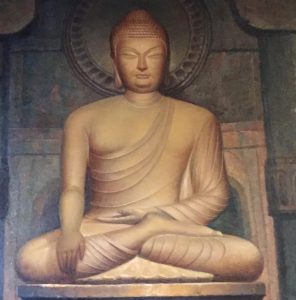
By Bishop Kenjun Kawawata
With Bodhi Day approaching on December 8, let’s ponder its meaning for us. Bodhi Day observes the day the Buddha became enlightened.
People generally consider Buddhism a religion, but it doesn’t fit the general concept of religion. Buddhism is the teaching of the Buddha and this teaching is called Dharma.
Essentially, Buddhism is a way of self-awareness or understanding. Buddhism began more than 2,500 years ago in India. The founder of Buddhism, Siddhartha Gautama, was born to a king and queen of the Shakya clan. He was set for life. His father wished he would succeed him as king and live a comfortable life full of wealth and power, sheltered from human sufferings.
However, the first time Siddhartha ventured from the palace, he saw sickness, aging and death—realities of human life. From then, he constantly thought about the suffering he witnessed. He contemplated how he could transcend suffering and attain peace of mind. He knew wealth and power couldn’t lead him to real peace. Just how does one achieve peace of mind?
At age 29, he left the comforts of his palace home. Trying to transcend suffering, he visited ascetic practice teachers in hopes of learning how to attain his goal. At that time in India, ascetic practice was a legitimate and preferred path towards attaining a pure mind and spirit—the state of Nirvana. After six years of futile searching, he finally gave up. He washed his body and sat under a big tree for meditation. He realized he needed to reconsider his way of attaining peace of mind. According to the story, in the early morning of December 8, while gazing at a morning star, he came to the realization that the cause of human suffering is ignorance. He found such ignorance in himself. He shouted, “Oh darkness, Ignorance!” He became known as The Awakened One and the tree became known as the Bodhi Tree. Bodhi means enlightenment.
Exactly what is ignorance? Ignorance means we don’t know truth. What is truth? Truth is impermanence. For us, impermanence means aging, sickness and death. In our daily lives, we don’t want to think like this. We always try to avoid or escape from this truth. We always wish to be young and healthy.
The Buddha also wished to be young and healthy. He wished to live an unchanging life. The Buddha shouted to himself, “Ignorance!” This shout represented a real understanding of himself and of universal truth. The Buddha found he lived in a world of impermanence that is himself.
Impermanence is life. Life is impermanence. He accepted his life as it is. From this point he could discover the teaching of Truth—Dharma—and a new life. Buddhism is based on his awakening and his teaching, which lead us to true understanding of self and to peace in our daily lives. That’s why we celebrate the day of Bodhi Day, a day of awakening, and reflect on how his awakening helps shape each and every one of our lives.
Rev. Kenjun Kawawata is bishop of Higashi Honganji’s Hawaii district.

